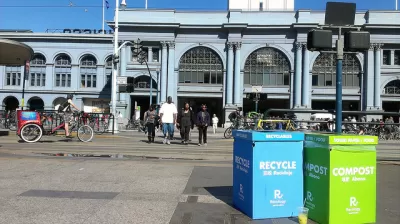In an effort to address climate change, San Francisco has a plan to get residents and businesses to do more than just recycle and compost.

Recycling and composting have long been a part of life in San Francisco. Now the city is leading the way with a no-waste initiative. It is asking other cities to join it in a commitment to decrease the amount of all waste and recyclables by 15 percent and the amount of material going to landfills by 50 percent by 2030.
To push beyond just recycling and composting, city leaders are coming up with ways to get more materials out of the waste stream. “Residents will have to voluntarily give up some of the stuff they buy, for example, and more pressure will have to be exerted on manufacturers to make things that don’t break down,” reports Kurtis Alexander.
San Francisco is hosting the Global Climate Action Summit, an event bringing together environmental activists and leaders from around the world, starting September 12. The Trump administration’s reversal of policies intended to curb climate change means more efforts are happening at the state and local levels:
Absent federal leadership, organizers of the San Francisco summit expect to roll out initiatives among cities, states and other subnational governments, as well as from businesses, with such climate goals as making buildings more energy efficient, increasing investment in environmentally friendly bonds and generating zero waste.
The city plans to promote its zero-waste initiative at the summit as a way to encourage other cities to reduce methane and energy use.
FULL STORY: S.F. invites world to join in zero-waste initiative

Alabama: Trump Terminates Settlements for Black Communities Harmed By Raw Sewage
Trump deemed the landmark civil rights agreement “illegal DEI and environmental justice policy.”

Study: Maui’s Plan to Convert Vacation Rentals to Long-Term Housing Could Cause Nearly $1 Billion Economic Loss
The plan would reduce visitor accommodation by 25% resulting in 1,900 jobs lost.

Planetizen Federal Action Tracker
A weekly monitor of how Trump’s orders and actions are impacting planners and planning in America.

DC Extends Application Window for Outdoor Dining Permits
District restaurants will have until the end of November to apply, but businesses with permits in rush hour parking lanes must end operations on July 31.

Wind Energy on the Rise Despite Federal Policy Reversal
The Trump administration is revoking federal support for renewable energy, but demand for new projects continues unabated.

Passengers Flock to Caltrain After Electrification
The new electric trains are running faster and more reliably, leading to strong ridership growth on the Bay Area rail system.
Urban Design for Planners 1: Software Tools
This six-course series explores essential urban design concepts using open source software and equips planners with the tools they need to participate fully in the urban design process.
Planning for Universal Design
Learn the tools for implementing Universal Design in planning regulations.
Caltrans
Smith Gee Studio
Institute for Housing and Urban Development Studies (IHS)
City of Grandview
Harvard GSD Executive Education
Toledo-Lucas County Plan Commissions
Salt Lake City
NYU Wagner Graduate School of Public Service


























